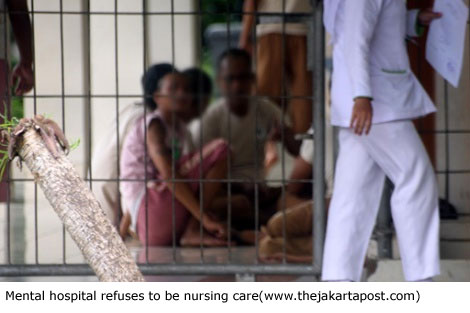 Hey Ma’am. Give us Rp 2,000 [20 US cents]” a woman called out as The Jakarta Post passed by her at Soeharto Heerdjan Mental Hospital. She sat with two other patients behind the bars separating the patient area from the public area.
Hey Ma’am. Give us Rp 2,000 [20 US cents]” a woman called out as The Jakarta Post passed by her at Soeharto Heerdjan Mental Hospital. She sat with two other patients behind the bars separating the patient area from the public area.
The patients wore T-shirts and trousers. Most were bald and thin. They looked at people passing in front of them with curiosity, or yelled in a strange manner.
Although several buildings are old, the hospital is quite clean — at least the area that visitors can access. The floor is shiny and janitors swab the tiles every time it looks dirty.
Few know what happens in treatment wards or isolation rooms, because only nurses and doctors are allowed to go there.
It is not easy for visitors like journalists to obtain access to the hospital. One has to meet with hospital authorities and sign an agreement with several stipulations, including a ban on taking close-up photos and mentioning the names of patients. The permit process takes hours.
This is the situation at the mental hospital in Grogol, West Jakarta, the biggest state mental hospital in Indonesia. The hospital accommodates 300 patients and serves 150 patients with mental disorders daily. There are 13 doctors, mostly psychiatrists, and 200 nurses.
Soeharto Heerdjan medical director Reza Syah told the Post the hospital treated patients with severe mental disorders like schizophrenia, bipolar disorder, acute hallucinations and severe depression.
Usually patients come from Jakarta and nearby municipalities like Tangerang, Depok and Bekasi. Some are beggars or homeless.
“Based on research, only 2.5 percent of severe mental disorder patients are treated in mental hospitals, but patients with light disorders or more than 90 percent are in the community,” Reza said.
He said there were many symptoms of mental disorders. People often forget that worry, stress, phobias, paranoia or senility can be symptoms, which many suffer from.
Today, Reza is trying to change the image of the mental hospital as a place offering nursing care for patients. Previously, families took patients to the hospital and left them there for years.
“We want to serve more patients so we hope after 21 days of intensive treatment they can go home and then we routinely check their health at the hospital,” Reza said.
But what happens if the family refuses to care for the patient?
“They can ask a social agency to take care of them. But here, in the hospital, we just treat them medically,” he said.
Reza believes medicine can be effective after two weeks of treatment.
“This strategy will help other patients who need medical treatment. Our capacity is small and many patients must get fair treatment as well,” he said.
However, Reza said many patients who were allowed to go home then forgot to consume their medicine. No wonder many have to be re-treated in the hospital later.
“The medicine is important. But we have to understand they don’t have money to buy medicine,” he said, adding that the majority of patients were poor.
Source: thejakartapost.com








